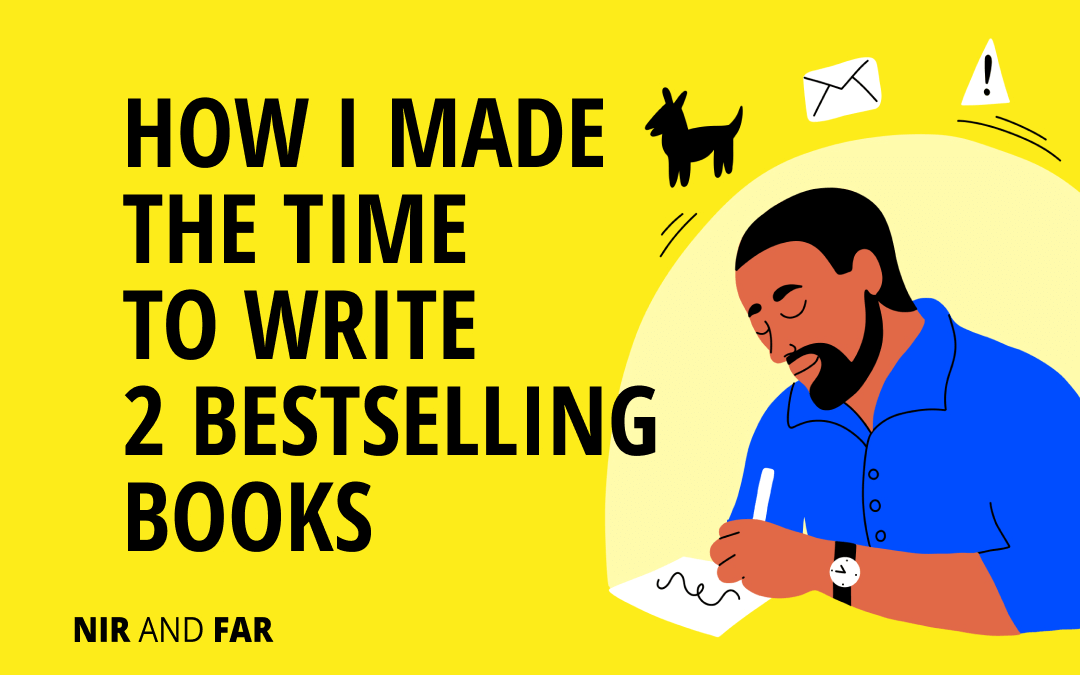So you want to write a book. Awesome!
If you’ve made attempts already, I’m sure I don’t need to tell you that writing is hard work. I’ve written two books and countless articles, and it wasn’t, and still isn’t, easy.
I wrote my second book, Indistractable, about controlling your attention and choosing your life because I had such a hard time fighting distractions.
Indistractable is my living proof that you can write a book—even if your life is hectic and focusing seems impossible.
Committing to a writing routine is a challenge. But if writing a book is important to you, you have to make time for it.
Whether you’re a professional writer or aspiring to write your first book, these are the best tips and techniques for designing a writing routine and sticking to it.
Why Write?
Your writing routine is over before it begins if you don’t ask yourself this question: Why do you want to write a book?
The answer can’t be some vague thought, like “Oh, I’ve always wanted to,” or a manifestation to become famous or rich.
The only way you will commit to a writing routine is if writing a book fulfills one of your values. Our values are attributes of the person we want to be. By identifying our values, we can then determine the activities that help us fulfill them; those activities are known as traction.
If you feel compelled to write a book, chances are it fulfills your value of wanting to be creative, driven, ambitious, or curious. And if writing fulfills one of your values but you don’t make time for it, you’ll likely feel discomfort.
Renowned author Maya Angelou said, “There is no greater agony than bearing an untold story inside you.” I would argue that “agony” is the discomfort a person feels if they want to write but never follow through.
Your reason for writing a book has to be values-based because it is the foundation of your writing routine. There will likely be many doubt-filled moments along your writing journey that might convince you to quit. Having a clear values-based reason for why you’re doing it, such as wanting to nurture your creative side, will keep you on the path toward traction.
Design a Writing Routine by Timeboxing
First things first: This post is about building a writing routine, not a writing habit, which doesn’t exist. A habit is a behavior that requires no conscious thought, and that is certainly not writing.
Many people seem drawn to the idea of a writing habit because they want to magically make writing effortless. But nothing is going to make writing easier. All you can do to get it done is make time for it.
How much time do you want to give to living out your values? Make it specific.
Whatever period of time you choose, block off that writing time in a timeboxed calendar to help you stay on schedule.
Timeboxing is a time management technique that blocks periods to work on distinct tasks without distraction. By timeboxing, you can get real about how much time you have for your writing routine in relation to your other tasks. It forces you to turn your values into time and prioritize which values are most important because there’s only so much time available each day.
Timeboxing also frees you from basing your progress on word count or the quality of your writing. Some days, getting words onto paper or the computer screen feels like prying each word out with pliers. Using timeboxing, traction isn’t measured by output. All that matters is that you show up to do what you said you would when you said you would without distraction.
Try my free schedule maker template to timebox your writing routine. Don’t worry about timeboxing every minute of your day for now. Just schedule your writing hours, and make sure you adhere to them. Then, schedule time to live out the other values in your life.
Make Your Writing Routine Impervious to Distraction
Being a writer requires creativity and tapping into the human creativity that comes from focusing intensely on the task at hand. To protect your writing routine, you have to learn to become Indistractable.
Get Comfortable with Discomfort
Internal triggers are negative feelings that cue us from within and drive us to seek relief through distraction. They are why you find yourself picking up your smartphone to scroll through Instagram when you should be focusing on a boring or challenging task.
Recently I spoke with a reader who has been writing her book for three years but lately has felt defeated by distraction. When I asked her to explain why, she said, “I’m afraid that once I write the last word, I have no control. It will start to live its own life.”
If there’s one thing I’ve learned by writing Hooked and Indistractable, it’s that writing, while sometimes fun, is also full of boredom, self-loathing, and self-doubt.
You’re likely going to doubt whether you’re capable of writing a book, to wonder whether it’s futile because people might not want to read it, and to start thinking your time would be better spent doing something else.
Many people also get discouraged when they don’t hit a “flow,” an enlightened state of mind in which they feel unstoppable, focused, and highly effective. Waiting to conjure a state of flow just makes them more susceptible to distraction.
It’s normal for authors to feel discomfort every day. But are you going to be a victim to the feeling? You have to get comfortable with being uncomfortable.
Whenever I feel doubt, pity, stress, anxiety, or uncertainty, I repeat to myself, This is what it feels like to get better.
There are other techniques for disarming internal triggers too. A powerful method is to explore the internal trigger with curiosity instead of contempt.
Try surfing the urge: When an internal trigger pops up, notice the sensations and ride them like a wave. Neither pushing them away nor acting on them helps us cope until the feelings subside. This is similar to the 10-minute rule: Wait 10 minutes before giving in to a distraction, and you might find you no longer have that urge.
As a writer, you might also take pleasure in journaling during a morning brain dump to get ahead of your internal triggers and worries right from the start.
We can also reimagine the task of writing by looking for the fun in it and focusing on it more intensely. You might add play to your writing by adding constraints or variability; for example, challenge yourself to alternate short and long sentences or vary your sentence openings.
Thwart External Triggers
Today, much of our struggle with distraction is a struggle with external triggers, the cues in our environment that tell us what to do next, like the pings, dings, and rings that prompt us to check our emails, open a news alert, or answer a phone call.
Hacking back these external triggers so they don’t interrupt you during your timeboxed writing period is crucial.
The people in our life can also be external triggers. Consider the story of Wendy, a freelance marketer and aspiring writer whose writing routine is set in her calendar on days when she’s not busy with client meetings. She has a business partner with whom she shares the responsibility of these client meetings, and she often agrees to schedule meetings during her triweekly timeboxed writing hour.
Yet when I dug into whether those meetings were important enough to miss her writing time, the truth came out: Wendy didn’t miss her writing time because her clients and business partner couldn’t wait an hour; she missed it because she didn’t want to do the hard work of writing, and her clients and business partner were an excuse.
Don’t lie to yourself.
I suggested Wendy use schedule syncing to let her business partner and clients know she was unavailable during her timeboxed writing hours.
Schedule syncing is when we collaborate with the people in our life to build a schedule and be transparent about how we spend our time. It enables us to fulfill our obligations to others and to ourselves. It also lets others know when we’re available and when we aren’t.
Telling yourself you’re going to write on Saturdays from 8 to 10 a.m., for instance, isn’t going to work if your partners, roommates, or kids knock on your door, or if your friends propose getting together during that time.
What will work is if they all understand that you are never (barring an emergency) to be disturbed during those few times when writing is a priority.
Join a Writer’s Group
A common misconception is that writing is a solitary act. In my experience, writing a book is more likely to happen when other people get involved.
Many writers find that a writer’s group is essential. Writer’s groups offer support in myriad ways. They provide feedback on your writing and a sympathetic ear during the infuriating writing process. Most important, they hold you accountable, acting as a precommitment pact that prevents you from sliding into distraction.
In many writer’s groups, members make a pact to prepare a written piece for the group to critique at each meeting. If you have nothing to share, you’re letting down your fellow members. Your desire to avoid their disappointment will motivate you to write.
I myself made a price pact with a friend to write Indistractable (after many false starts, half-finished chapters, and incomplete outlines): I agreed to pay him $10,000 if I didn’t finish a first draft of the book by a set date. We got together daily to work next to each other in 45-minute sprints. Then we’d take a quick break and start again. Having him there, plus the threat of losing a huge sum of money, ensured I’d finish the manuscript and keep my money.
Call Yourself a Writer
You might also have success with making an identity pact—a precommitment to a self-image that helps us pursue what we really want.
The idea is that our perception of who we are changes what we do.
So, if you want to write a book, don’t just tell yourself you want to write. Tell yourself you are a writer—and tell everyone else too. Talking to others about your identity pact keeps you accountable to your writing goals.
As you build and incorporate a writing routine in your life, just remember that it will take time. Writing a book is difficult for everyone. Be patient with the process. And become Indistractable to give your book the best chance of coming to fruition.
Related Articles
- Schedule Maker: a Google Sheet to Plan Your Week
- Habit Tracker in Google Sheets – Free Template
- A List of 20 Values [and Why People Can’t Agree On More]
- Timeboxing: Why It Works and How to Get Started in 2024
- An Illustrated Guide to the 4 Types of Liars
- Hyperbolic Discounting: Why You Make Terrible Life Choices
- Happiness Hack: This One Ritual Made Me Much Happier

